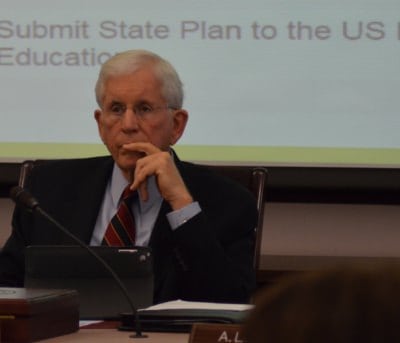

On the day before the General Assembly convened this week to launch the 2017-18 legislative cycle, 50 or so people gathered over lunch in downtown Raleigh for a charmingly unusual campaign reunion. They assembled to remember and celebrate the campaign of the candidate, not who won, but who lost the 1972 election for governor.
Hargrove (Skipper) Bowles, a classic 20th-century pro-business progressive Democrat, became such an endearing figure to his campaign staff that they have held reunions from time to time over the past 45 years. They point out how their campaign set new standards in state politics in the use of TV advertising and polling. And yet, Bowles lost to Republican James E. Holshouser Jr., who ran a well-modulated and targeted campaign and had the benefit of Richard Nixon’s landslide in the presidential election.
As a central theme of his candidacy, Bowles called for “career education,’’ with a special focus on community colleges. The concept stirred up controversy among advocates of both the university system and the public schools who worried that it would deemphasize academics. Still, as his son Erskine Bowles, a former White House chief of staff (who ran unsuccessfully for the U.S. Senate) recalled, Skipper used the metaphor of an interstate highway with off-ramps for workers to get more education or retraining, and on-ramps for them to get back on the road to a better livelihood.
As governor, Holshouser had his own agenda, not “career education’’ as Bowles proposed. The Republican governor, along with a Democratic legislature, expanded kindergarten statewide in public schools and raised teacher pay by approximately 7 percent in three of his four years in office.
In subsequent years, in fact, North Carolina has adopted an array of efforts that Skipper Bowles would recognize as aligned with his “career education’’ concept. For example, under Gov. Mike Easley, North Carolina won national recognition for its early college high schools. Over four decades, the state has sought to build smoother pathways from high school to community college, from community college to universities.
North Carolina’s new Democratic governor, Roy Cooper, inherits a state dramatically transformed in the 45 years since the Bowles-Holshouser campaign. Then, North Carolina had 5.1 million people, now 10 million. Then, North Carolina was a state more rural than urban, its economy defined by family tobacco farms, cigarette and furniture factories, and textile mills. Now North Carolina depends on a high-tech, metropolitan economy defined by big banks, pharmaceuticals, medical care, and research and development.
In broad terms in his inaugural address, Cooper sounded a Bowles-like theme: “From our great universities, to the outstanding community colleges across the state, North Carolina excels in equipping the next generation of students with the skills they need to compete in a global economy. We must invest in higher education once again.”
At an economic forecast forum, Cooper said he would seek to work with legislators to devise a pay plan that would lift teacher salaries to the national average over four years. He has regularly recalled that North Carolina teacher pay rose to the national average during the years, 1997-2000, when he served as Democratic Senate leader with Democrat Jim Hunt in the governor’s office.
Raising the pay of teachers and principals, while also re-investing in higher education, appears more daunting today than two decades ago. The economy, while recovering from the Great Recession, isn’t as super-charged as it was in the 1990s. Then, the legislature adopted pay raises ranging up to 9 percent in two fiscal years, up to 11 percent in another year, and up to 13.8 percent in the final Hunt-era budget.
The 2016 election gave North Carolina divided government — a Democratic governor and a legislature with a Republican super-majority. The 1972 election gave North Carolina the inverse, a divided government with a Republican governor and a Democratic legislative majority.
But, whatever the political lineup, each generation faces the challenges of aligning and upgrading its educational institutions to meet the demands of the economy and civil society of its times. In today’s political world, a leader has to persist in “campaigning’’ to build public will for his approach to governing. Maybe Cooper needs a good strong metaphor.


